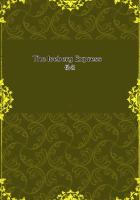People made way for her as she passed, others turned round and looked at her, and she received a great many greetings and pressings of the hand, all of which she accepted with the most delicate dignity.
But though she smiled upon every one, she said nothing until she reached the last of the rooms, where she found her elder son.
Then, "This is enough, sir," she declared with measured softness to Newman, and turned to the marquis.He put out both his hands and took both hers, drawing her to a seat with an air of the tenderest veneration.
It was a most harmonious family group, and Newman discreetly retired.
He moved through the rooms for some time longer, circulating freely, overtopping most people by his great height, renewing acquaintance with some of the groups to which Urbain de Bellegarde had presented him, and expending generally the surplus of his equanimity.He continued to find it all extremely agreeable; but the most agreeable things have an end, and the revelry on this occasion began to deepen to a close.The music was sounding its ultimate strains and people were looking for the marquise, to make their farewells.There seemed to be some difficulty in finding her, and Newman heard a report that she had left the ball, feeling faint.
"She has succumbed to the emotions of the evening," he heard a lady say.
"Poor, dear marquise; I can imagine all that they may have been for her!"But he learned immediately afterwards that she had recovered herself and was seated in an armchair near the doorway, receiving parting compliments from great ladies who insisted upon her not rising.
He himself set out in quest of Madame de Cintre.He had seen her move past him many times in the rapid circles of a waltz, but in accordance with her explicit instructions he had exchanged no words with her since the beginning of the evening.The whole house having been thrown open, the apartments of the rez-de-chaussee were also accessible, though a smaller number of persons had gathered there.Newman wandered through them, observing a few scattered couples to whom this comparative seclusion appeared grateful and reached a small conservatory which opened into the garden.
The end of the conservatory was formed by a clear sheet of glass, unmasked by plants, and admitting the winter starlight so directly that a person standing there would seem to have passed into the open air.
Two persons stood there now, a lady and a gentleman; the lady Newman, from within the room and although she had turned her back to it, immediately recognized as Madame de Cintre.He hesitated as to whether he would advance, but as he did so she looked round, feeling apparently that he was there.She rested her eyes on him a moment and then turned again to her companion.
"It is almost a pity not to tell Mr.Newman," she said softly, but in a tone that Newman could hear.
"Tell him if you like!" the gentleman answered, in the voice of Lord Deepmere.
"Oh, tell me by all means!" said Newman advancing.
Lord Deepmere, he observed, was very red in the face, and he had twisted his gloves into a tight cord as if he had been squeezing them dry.
These, presumably, were tokens of violent emotion, and it seemed to Newman that the traces of corresponding agitation were visible in Madame de Cintre's face.The two had been talking with much vivacity.
"What I should tell you is only to my lord's credit," said Madame de Cintre, smiling frankly enough.
"He wouldn't like it any better for that!" said my lord, with his awkward laugh.
"Come; what's the mystery?" Newman demanded."Clear it up.
I don't like mysteries."
"We must have some things we don't like, and go without some we do,"said the ruddy young nobleman, laughing still.
"It's to Lord Deepmere's credit, but it is not to every one's,"said Madam de Cintre."So I shall say nothing about it.
You may be sure," she added; and she put out her hand to the Englishman, who took it half shyly, half impetuously.
"And now go and dance!" she said.
"Oh yes, I feel awfully like dancing!" he answered."I shall go and get tipsy." And he walked away with a gloomy guffaw.
"What has happened between you?" Newman asked.
"I can't tell you--now," said Madame de Cintre.
"Nothing that need make you unhappy."
"Has the little Englishman been trying to make love to you?"She hesitated, and then she uttered a grave "No! he's a very honest little fellow.""But you are agitated.Something is the matter.""Nothing, I repeat, that need make you unhappy.My agitation is over.
Some day I will tell you what it was; not now.I can't now!""Well, I confess," remarked Newman, "I don't want to hear anything unpleasant.I am satisfied with everything--most of all with you.I have seen all the ladies and talked with a great many of them; but I am satisfied with you."Madame de Cintre covered him for a moment with her large, soft glance, and then turned her eyes away into the starry night.
So they stood silent a moment, side by side."Say you are satisfied with me," said Newman.
He had to wait a moment for the answer; but it came at last, low yet distinct: "I am very happy."It was presently followed by a few words from another source, which made them both turn round."I am sadly afraid Madame de Cintre will take a chill.I have ventured to bring a shawl."Mrs.Bread stood there softly solicitous, holding a white drapery in her hand.
"Thank you," said Madame de Cintre, "the sight of those cold stars gives one a sense of frost.I won't take your shawl, but we will go back into the house."She passed back and Newman followed her, Mrs.Bread standing respectfully aside to make way for them.Newman paused an instant before the old woman, and she glanced up at him with a silent greeting.
"Oh, yes," he said, "you must come and live with us.""Well then, sir, if you will," she answered, "you have not seen the last of me!"















